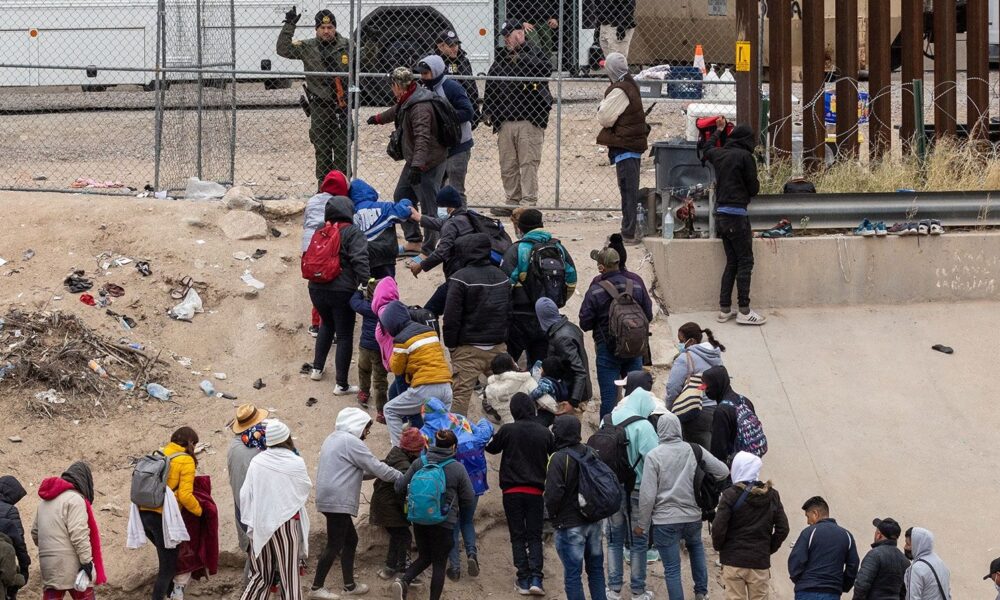Lower Migration In Germany: The Role Of Strengthened Border Security

Table of Contents
Increased Border Patrol and Surveillance
The German government has significantly invested in bolstering its border patrol and surveillance capabilities. This includes deploying additional border patrol officers along Germany's land and sea borders, particularly focusing on high-traffic areas. Simultaneously, there's been a massive increase in the utilization of advanced surveillance technologies.
- Increased patrols along the German borders: More officers are now patrolling key entry points, both internal and external, leading to increased detection of illegal crossings.
- Implementation of modern surveillance technology: Drones, thermal imaging cameras, and sophisticated sensor networks are used to monitor border areas effectively. This technology allows for wider coverage and improved detection of illegal activities.
- Enhanced cooperation with neighboring countries on border control: Germany works closely with its neighbors, sharing intelligence and coordinating joint patrols to prevent migrants from circumventing border controls. This collaborative approach has significantly reduced the effectiveness of smuggling rings.
- Examples of specific technological advancements: The use of facial recognition technology at border crossings and the deployment of unmanned aerial vehicles (UAVs) for reconnaissance are just two examples of technological advancements that have aided in tightening border security.
These measures have made illegal border crossings more difficult and riskier, acting as a significant deterrent for potential migrants.
Stricter Asylum Policies and Procedures
Germany's asylum laws and procedures have become considerably more stringent in recent years. Changes to the legislation and its implementation have directly impacted the number of successful asylum applications.
- Faster processing of asylum applications: While aiming for efficiency, faster processing times can sometimes lead to less thorough reviews.
- Increased scrutiny of asylum claims: Applicants face more rigorous questioning and evidence gathering to substantiate their claims.
- Higher rejection rates for unfounded claims: A higher percentage of asylum applications are now rejected due to the stricter criteria and more detailed investigations.
- Changes to the definition of "refugee status": The interpretation of what constitutes "refugee status" under international law has been reviewed, impacting the eligibility criteria for asylum seekers.
These stricter policies have undoubtedly reduced the number of successful asylum applications, contributing to the overall lower migration figures. However, concerns regarding fairness and due process remain.
Cooperation with Other EU Countries and International Organizations
Germany's engagement in collaborative efforts with other EU member states and international organizations has significantly strengthened its border security. This collaborative approach tackles migration challenges collectively and efficiently.
- Joint border patrols with neighboring countries: This shared responsibility reduces the pressure on individual countries and promotes a more coordinated approach to border management.
- Information sharing and intelligence gathering: The exchange of intelligence between countries helps identify and disrupt smuggling networks operating across borders.
- Participation in EU-wide migration initiatives: Germany actively participates in EU initiatives aimed at managing migration flows effectively and fairly.
- Collaboration with international organizations like Frontex: Frontex, the European Border and Coast Guard Agency, provides crucial support in border management and control operations.
This international cooperation has led to improved border security across Europe, indirectly impacting the number of migrants arriving in Germany.
Impact on Different Migrant Groups
The impact of strengthened border security on different migrant groups varies. Analyzing these differences is crucial for understanding the full consequences of these policies.
- Changes in the origin countries of migrants arriving in Germany: The stricter measures may have shifted the origins of migrants, with some nationalities facing higher rejection rates than others.
- Shifting demographics of asylum seekers: The profile of those seeking asylum in Germany may have changed, reflecting the impact of border controls and stricter eligibility criteria.
- Potential impact on vulnerable groups: Concerns exist regarding the disproportionate impact on vulnerable groups, such as unaccompanied minors or those fleeing persecution.
The ethical and humanitarian implications of these changes require careful consideration. While enhancing border security aims to manage migration effectively, it’s crucial to balance this with the protection of human rights and the provision of support to vulnerable individuals.
Conclusion: The Influence of Strengthened Border Security on Lower Migration in Germany
The lower migration numbers observed in Germany in recent years are undeniably linked to the strengthened border security measures. Increased border patrols, stricter asylum policies, and enhanced international cooperation have collectively contributed to this decline. However, the long-term implications, particularly on vulnerable groups and the ethical dimensions of these policies, remain significant areas for continued discussion.
Future challenges will include balancing effective border management with humanitarian considerations and adapting to evolving migration patterns. Effective strategies require a multifaceted approach that considers the root causes of migration, provides pathways for legal migration, and ensures the humane treatment of all migrants.
To further understand the complexities of German migration policies and the ongoing debate surrounding border security and its impact on lower migration in Germany, we encourage you to explore additional resources and engage in informed discussions. The issue requires ongoing scrutiny and thoughtful consideration to ensure a just and sustainable approach to migration management.

Featured Posts
-
 Tylor Megill And The Mets Analyzing His Effective Pitching Techniques
Apr 29, 2025
Tylor Megill And The Mets Analyzing His Effective Pitching Techniques
Apr 29, 2025 -
 Minnesotas Film Industry A Tax Credit Analysis
Apr 29, 2025
Minnesotas Film Industry A Tax Credit Analysis
Apr 29, 2025 -
 Germanys Successful Border Control Measures Reduced Migration Numbers
Apr 29, 2025
Germanys Successful Border Control Measures Reduced Migration Numbers
Apr 29, 2025 -
 Inside The Ccp United Front A Minnesota Case Study
Apr 29, 2025
Inside The Ccp United Front A Minnesota Case Study
Apr 29, 2025 -
 New Study Reveals Upward Mobility For Minnesota Immigrants In The Job Market
Apr 29, 2025
New Study Reveals Upward Mobility For Minnesota Immigrants In The Job Market
Apr 29, 2025
Latest Posts
-
 Lower Migration In Germany The Role Of Strengthened Border Security
Apr 29, 2025
Lower Migration In Germany The Role Of Strengthened Border Security
Apr 29, 2025 -
 Germanys Successful Border Control Measures Reduced Migration Numbers
Apr 29, 2025
Germanys Successful Border Control Measures Reduced Migration Numbers
Apr 29, 2025 -
 Post Covid Migration To Germany At Historic Low Impact Of Border Controls
Apr 29, 2025
Post Covid Migration To Germany At Historic Low Impact Of Border Controls
Apr 29, 2025 -
 Germanys Stricter Border Controls Lowest Migration Since Covid 19
Apr 29, 2025
Germanys Stricter Border Controls Lowest Migration Since Covid 19
Apr 29, 2025 -
 Anthony Edwards Injury Latest News And Game Time Decision For Timberwolves
Apr 29, 2025
Anthony Edwards Injury Latest News And Game Time Decision For Timberwolves
Apr 29, 2025
